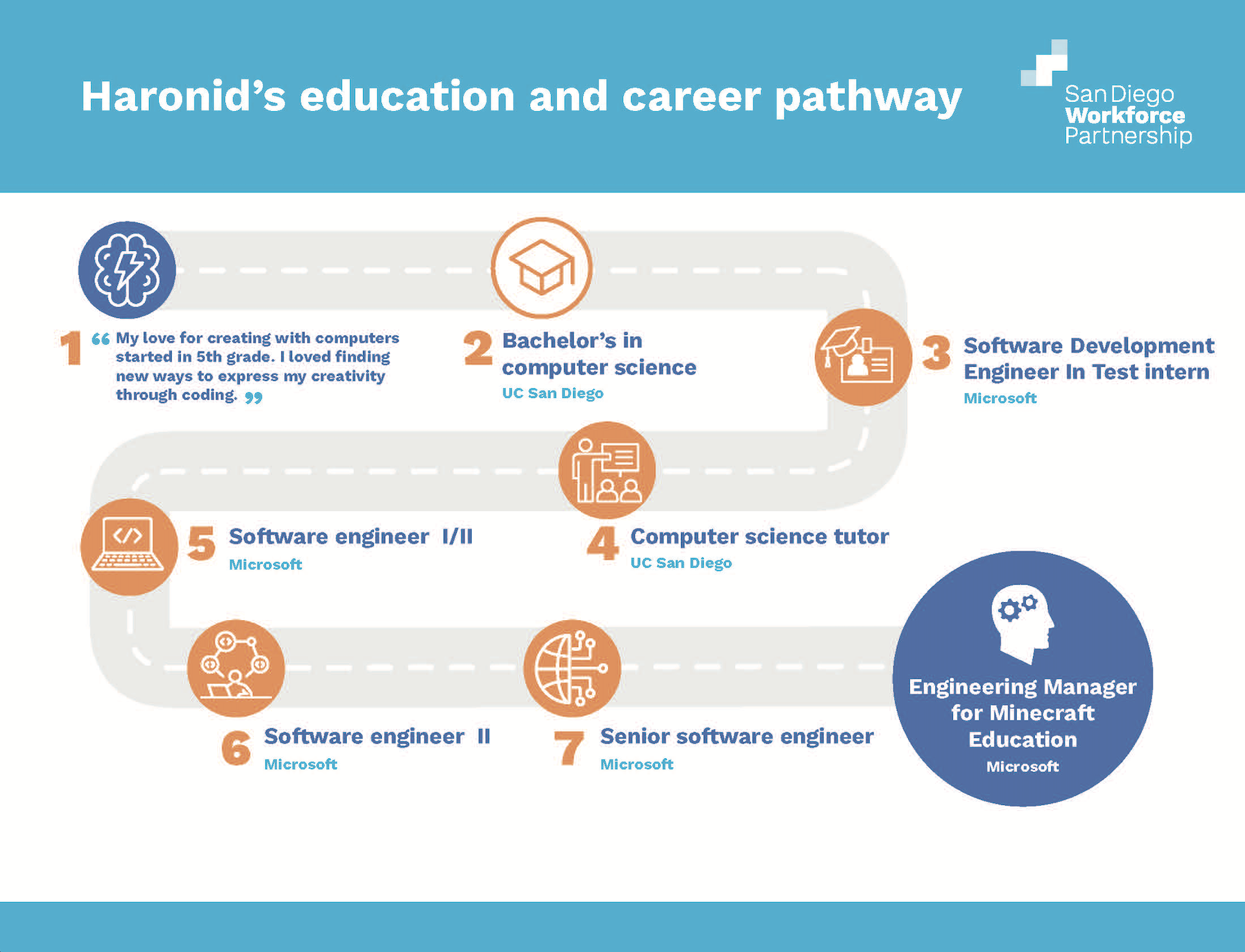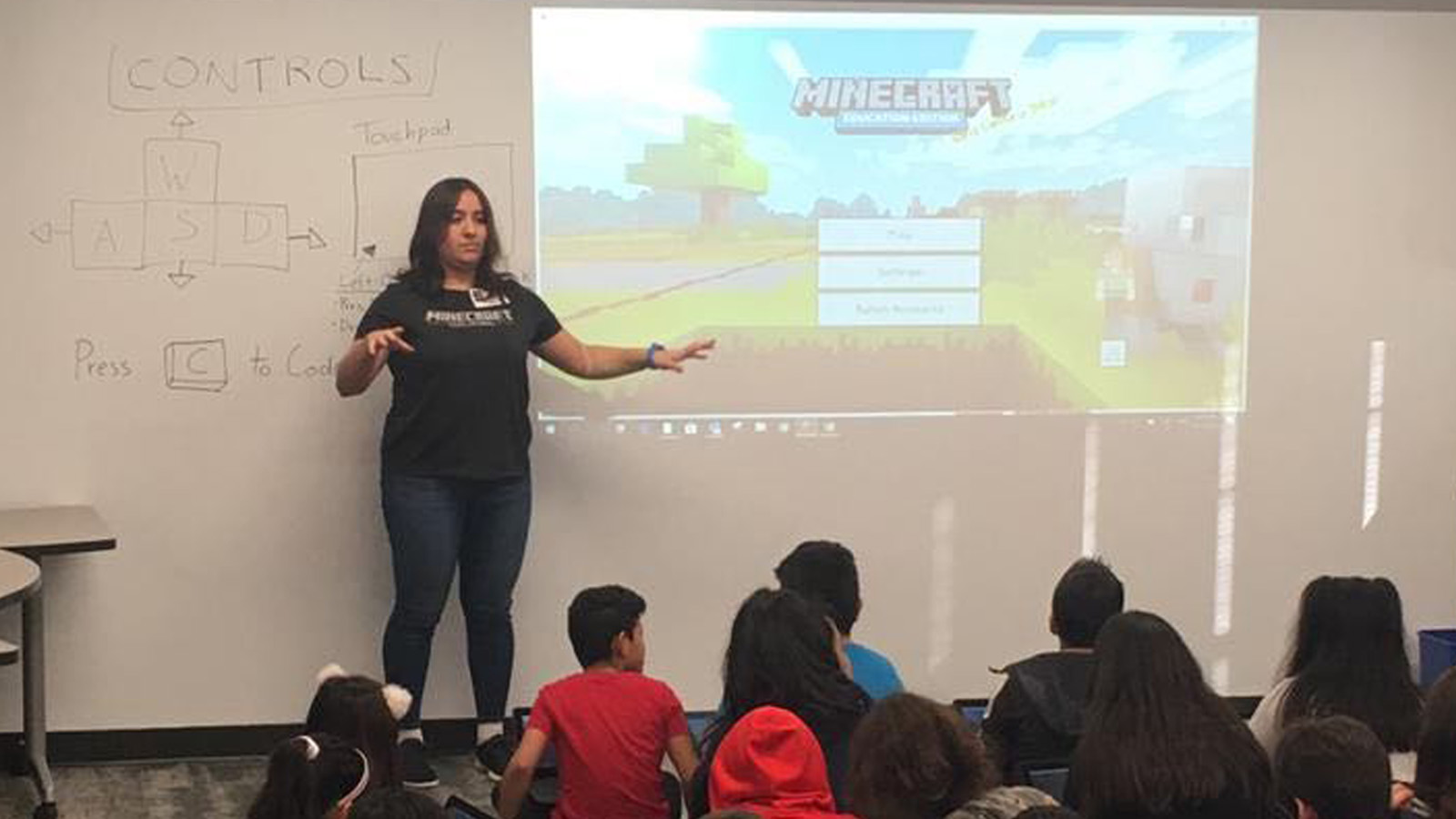Haronid Moncivais
How did you get to where you are today? What was your training or education?
I went to school through high school in Tijuana, Mexico, which is right across the border from San Diego. When I was in fourth grade, I wanted to be a writer because I really loved reading and making up stories. Later, I think it was that same creativity that drew me to computer science. I took my first computer science class in high school; it was Introduction to Java. I wrote my first line of code that printed a line of text to the screen saying: “Hola Mundo!” (hello world in Spanish). I remember just thinking, “I did that! I told the computer to do something, and it did it. Oh, my gosh, I can do anything! I can write code that will create whatever I want!” That moment taught me that there are no limits, because everything is possible with software. It opened up a new world for me and I knew I needed to do this for a living.
When it was time to go to college, I had an amazing opportunity to study computer science at UC San Diego. I liked the fact that it was very close to home because it was my first time living in another country. During my freshman year, my first computer science teacher told us about the upcoming career fair, where we could meet different companies and learn about the opportunities they have for students. I remember thinking, “Oh, I’m a freshman, I know nothing. Why would a company be interested in me?” But my teacher made us promise to go, so I did. I met with a lot of companies at the career fair, including Microsoft. I remember the Microsoft recruiter was a very, very kind person and he told me, “If you’re excited about computer science, that gets us excited, too. You should apply.” Just like that, I applied for a summer internship at Microsoft and that’s how I started working there.
I learned so much during my internship, and I loved that the work I was doing was having a real impact on real people around the world. The people I worked with were so kind with their time and their knowledge and that’s what kept me coming back year after year for different internships, and eventually as a full-time engineer.
Something that is very cool about Microsoft is that you can jump around to experience new areas of the company. When I first started, I worked on the voice assistant for Windows Phone. I have since worked on Windows, online safety, game services and eventually landed where I am now in Minecraft Education. At Minecraft Education, a big part of what I do is computer science education for students. I’m glad that I get to blend my passion for education with my engineering sills here, because one thing that I really missed from school was tutoring and teaching others.

Describe your job. What does a typical day look like at your job?
I’m an engineering manager for the Minecraft Education team. One of the things that’s exciting about being a manager is that there’s no such thing as a typical day. Every day, there’s a new thing to be working on or a new problem to solve. But a somewhat typical day might look like starting my day in a meeting called “triage.” This is when I meet with Minecraft Education’s quality lead, whose focus is on testing the product for quality, and the program manager lead, whose focus is on the user experience. We come together to sort through problems we found the previous day. Because we don’t have time to tackle every problem, we decide which ones we focus on, which we can leave for later and which we may not even fix.
After that, I might spend time thinking about the product. We have two sides to our product: the Minecraft game, which is the client code that runs on the computer, and Minecraft game services, which handle things like user accounts, logins and multiplayer. In software engineering, you’ll usually focus on only one side or the other, so it’s very cool to be able to work on both. It’s fun to learn new things by seeing what my engineering team is up to so I can jump in and help.
I also spend a lot of time meeting with my team one-on-one. Some of that time is used to understand what they’re working on, how they’re doing and if there are any problems that I can help with. Helping can be any number of things, like me debugging alongside them or connecting them with other people. I also try to spend some time talking to them about their careers and growth. It’s important to me that people on my team can do the type of work that gets them excited and helps them grow into the type of engineer they want to be. I spend a lot of time thinking about, “What is the next opportunity for this person? How do I help them get there?”
I try to spend some of my time on my own growth. I don’t have as much time to code as I would like to, but whenever possible, I try to sneak away and code a little bit. Maybe I’ll fix a bug or get a little feature into Minecraft Education as a fun project.
What are some of the most important skills you use in your work?
Communication and collaboration are both incredibly important. It’s such a big misconception with computer science that we are stuck with a computer in a dark room and don’t talk to anybody all day. It has never been like that in my entire career; it is actually a lot of talking to other people, problem solving and brainstorming together.
For programmers on my team, I encourage them to go out and meet students and teachers who are using Minecraft education in their classrooms. When they’re there, they talk to our users and ask them, “What’s working? What’s not working?” Then they can take that into account when they think about how to design the next feature we add into the game.
As a manager, I’m also focused on the people on my team: how do I help them grow? Who should I pair together on the next project? It’s a little like being a leader in group projects at school.
What advice do you have for students thinking about working in computer science?
I remember my first math class in college was a calculus class and it was the first time I had ever taken an advanced math class taught in English. You would think, “well, math is kind of the same in any language”, but the terms are all different. I left that first class not understanding anything and was really worried about whether I made the wrong choice going to school in another country. I decided to explain my struggles to the professor and she suggested giving me the schedule in advance so I could review those chapters and new vocabulary before class. That made a huge difference. I want students to know that something that feels really big in the moment can turn out to have a very simple solution. My advice would be, if you are in an overwhelming situation and scared to take the next step, that is very normal. Take a breath and try anyway, and ask for help. You can ask for help from teachers, friends, parents or other adults. You will be surprised how much people want to help you and how much you can achieve with their help.



